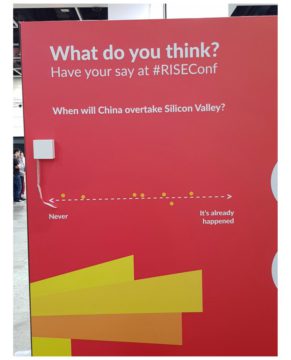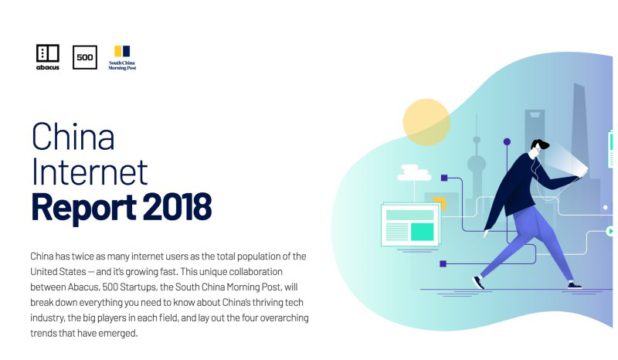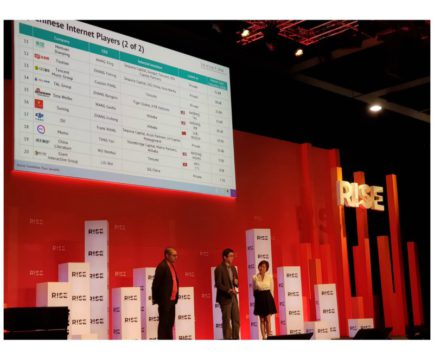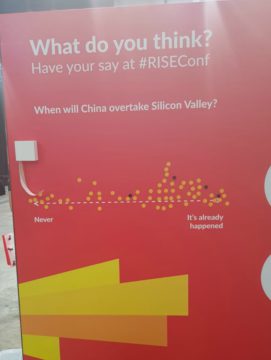China is a major theme this week at RISE, the largest tech conference in Asia, taking place at the Hong Kong Convention and Exhibition Center from July 9-12.
Besides wide attention for Chinese latest startups and tech developments, a central question posed at this year’s conference is if China is the current world leader in technology, and if it has thus surpassed Silicon Valley as the global tech powerhouse.

In the morning of July 12, Edith Yeung (500 Startups), Ravi Hiranand (Abacus), and Chua Kong Ho (South China Morning Post) reveal the hugely publicised China Internet Report, which brings a definitive outlook of the companies, industries and trends that are changing the technology space.
Also on Tuesday, another panel with various speakers from Bloomberg to Withinlink address the question of whether or not China is now the world leader in technology, and if its rise should be feared by the US.
What’s on Weibo is here at RISE to live report for you – refresh page for updates (update: live blog now closed).
China Internet Report (10:30 HKT)
In their presentation of the latest findings when it comes to China and the internet, Edith Yeung, Ravi Hiranand, and Chua Kong Ho present four major themes that are crucial to digital China.
Firstly, as explained by Chua Kong Ho, “Chinese Internet giants are doing everything.” The major players such as Baidu, Alibaba, and Tencent are not just involved in e-commerce or social media, but also, for example, in the e-sharing economy, gaming, education, media, or artificial intelligence – penetrating all markets that matter in China today.
“Chinese Internet giants are doing everything.”
Second, Chinese internet empowers rural populations. E-commerce platforms such as Taobao, for instance, give ample new opportunities to people in the Chinese countryside to set up new businesses; a crucial theme in China’s digital developments today, as it greatly impacts society.

The Chinese Internet Report launched today, click to see. (URL https://www.abacusnews.com/china-internet-report/).
Third, Chinese internet companies embrace ‘social’: social media plays a major role in China’s digital market, arguably much more than it does in countries such as the US.
And last, Ko explains, the Chinese government is the visible hand – controlling all corners of the Chinese internet.
Biggest Tech Trends in China (10:40 HKT)
As Edith Yeung dives deeper in what matters in China today when it comes to digital developments, she focuses on the importance of AI and how tools such as facial recognition are playing an increasingly important role in Chinese society today; not just for practical matters such as train ticket collections, but also for governance, helping catching fugitives or jaywalkers. In terms of AI, China is investing the most in the world right now.

China’s first robot dentist fits implants into a patient’s mouth in 2017 (photo via Dailymail).
Robotics is also an area of major development in China, as intelligent service robots continue to upgrade across industries, including e-commerce and healthcare. As an example, Yeung mentions that in September 2017, the first robot dentist was introduced in the PRC.

Yeung, Hiranand, and Ko at Rise 2018 (photo whatsonweibo.com)
“Chinese consumers are crazy about cryptocurrency,” Yeung also emphasizes, and the cryptocurrency trading market is a huge and booming one – although “the government is not too friendly to the market.”
But blockchain technology is applauded more from the authority side. Although still in its infancy, companies such as Alibaba are already working with the government in applying blockchain technology across various industries.
Launch: The full Chinese Internet Report 2018 can be found here.
Attitudes that matter (11:00 HKT)
For Edith Yeung, who was selected by Inc’s Magazine as “one of the Silicon Valley investors you must know,” the question of whether or not China is the global tech leader is not a difficult one.
“China is leading and people elsewhere in the world have no clue.”
“I really think China is leading in so many areas, and people elsewhere in the world just have no clue,” Yeung says during the Q&A following the presentation of the China Internet Report.
Yeung also links the growth of Chinese tech companies to the working attitude of the people that is related to China’s history.

“My generation, let’s say those thirty-plus generations, remembers what it means to be poor. And that you have to work hard to be successful. People work hard because they can remember those days, and that attitude is not likely to change over the coming decades. There’s no nine to five attitude.”
World Leader in Technology (11:55 HKT)
Silicon Valley has always been seen as the world leading technology hub. During another RISE panel, simply titled “Is China now the world leader in technology?”, speakers Bessie Lee (Withinlink founder), Wayne Xu (Zhongan International president), Harry Hui (ClearVue Partners founding partner), Lei Chen (Xunlei CEO), and Tim Culpan (Bloomberg columnist) will address if the US should fear the rise of China as a tech superpower.
For moderator Tim Culpan, the answer is simple: “Obviously the answer is yes. We’re done here.”
But for the other speakers, the answer is not that straightforward. Bessie Lee sees two sides to China’s rise: “Is China a world leader in tech? Yes and no,” she says: “In mobile, e-commerce and mobile, China is definitely leading. But when it comes to privacy protection, for example, they are not leading in all aspects.”
Lee stresses that in mainland China, the regulations always fall behind the technology development. “It’s not there yet,” she states.
“They run fast. Those who do not run fast will be left behind.”
Other speakers agree with Lee. Wayne Xu sees China as a leader in financial and consumer-facing areas, whereas it is still lacking in others. “But as for AI, China is leading,” – a statement all speakers today stress.
Harry Hui mentions that the boom of exciting innovation in China partly comes from the fierce competition between local players: “Because of this enormous competition, they need to depend on data and be very quick in how they innovate and keep launching new services to stay relevant. They run fast. Those who do not run fast will be left behind.”
Chinese companies and the government have more focus on technological development today than the US has, Xunlei’s Lei Chen states. But still, he says, China has a lot of catching up to do.
“Chinese are going to take on the US market, but the US are not going to take on the Chinese market.”
Lei does not agree with Lee that regulation is most problematic – he says it is the participants in the market that are often lacking in quality and tech knowledge. Nevertheless, when it comes to AI and blockchain, Lei stresses, “China’s overtake is around the corner.”

Both Harry Hui and Wayne Xu both say that China will follow its own path in its rise as tech leader; a unique road that is different from paths taken by other leaders such as the US.
According to Bessie Lee, one dimension of this road is that “Chinese are going to take on the US market, but the US are not going to take on the Chinese market” – a crucial dynamic that will eventually determine who the global tech leader will be.
As for today’s speakers, they all seem to agree that if China is not already the leader in tech, it will be in the future.

Hours after the kick-off of RISE, conference visitors also hold similar views (see image above); according to the majority of voters, “when China will overtake Silicon Valley” is not a question for the future – it is already happening.
Also read: The top ten things you need to know from the China Internet Report by Abacus.
This live blog is closed. Keep checking in on What’s on Weibo in days to come for more updates on RISE and latest news on what’s trending on Chinese social media.
By Manya Koetse
Follow @whatsonweibo
Spotted a mistake or want to add something? Please let us know in comments below or email us.
©2018 Whatsonweibo. All rights reserved. Do not reproduce our content without permission – you can contact us at info@whatsonweibo.com.
The post The Rise of China as Global Tech Superpower (Live @ RISE Hong Kong 2018) appeared first on What's on Weibo.